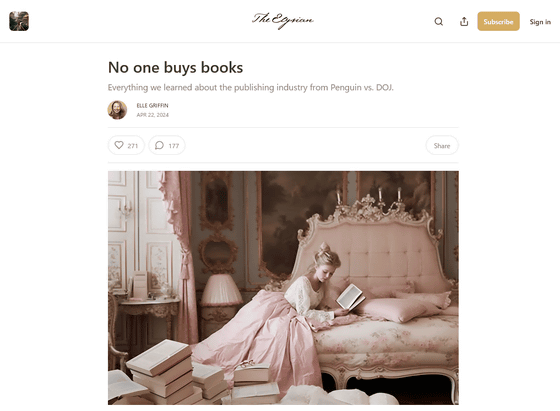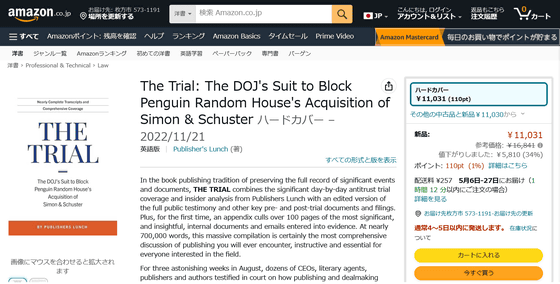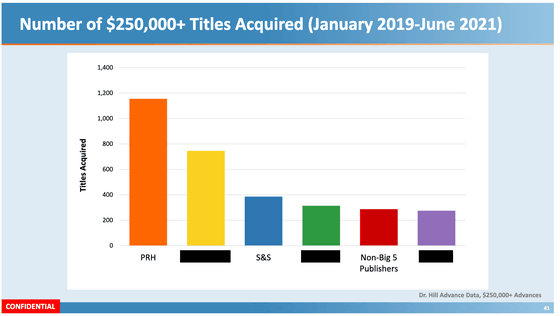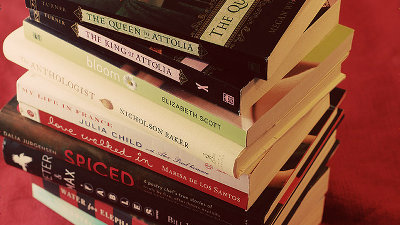Court records reveal that 90% of published books sold less than 2,000 copies and 50% sold less than 12 copies

Penguin Random House (PRH), the world's largest publisher in the United States, was trying to acquire Simon & Schuster (S&S), another American publisher, in 2022, but since PRH had a 37% market share and S&S had an 11% market share, the government sued them for violating antitrust laws. As a result, the merger was ruled impossible, but the court records of this ruling contain information to confirm the shares of both companies in the publishing market, and writer Elle Griffin points out that this shows how poorly published books are selling.
No one buys books - by Elle Griffin - The Elysian

The court records surrounding the merger of PRH and S&S are summarized in a book called ' The Trial .' Griffin summarizes the contents of 'The Trial' and lists some noteworthy points.
Amazon | The Trial: The DOJ's Suit to Block Penguin Random House's Acquisition of Simon & Schuster | Publisher's Lunch | Publishing & Books

According to Griffin, the big five publishers in the US (PRH, S&S, Holtzbrinck/Macmillan, Hachette, and HarperCollins) all spend most of their money on paying big name and multi-publisher popular authors, and the categories of Bibles, all-time bestsellers, and popular children's books make up the bulk of the publishing industry. Other projects tend to be the ones they spend the excess money on and sell very little.
In court records, Madeline McIntosh, who was CEO of PRH US at the time, answers questions about the publishing industry. In response to the question, 'Do you know how many authors in the industry sold more than 500,000 copies in the four years from 2018?' McIntosh replied, 'From my understanding, it was about 50 people.' In addition, a Department of Justice lawyer revealed that, based on data on 58,000 books published in a year, '90% sold less than 2,000 copies, and 50% sold less than 12 copies.'
Markus Doll, who served as CEO of PRH until December 2022, also spoke about the state of the publishing industry, saying, 'Of the thousands of ideas that come out every year, only a few reach the top. That's why I call editors and publishers the 'Silicon Valley of media.' We are angel investors in authors, their dreams and stories. 35% make a profit, and if you include those that make a profit on a donation basis, the profit is 50%. The rest are published through investment, so every book has the same chance of success.'

In addition, some books incur 'advance payments' rather than manuscript fees or royalties, and according to Nicholas Hill of consulting firm
Authors who receive such high advances include celebrities, athletes, and politicians. The graph below shows the number of advance transactions of more than $250,000 from 2019 to 2021. The five major publishers are listed, although the publishers other than PRH and S&S are hidden, and the purple shows 'non-top five publishers.' According to the graph, the top five publishers have an overwhelming number of high-value advance transactions compared to other publishers, and PRH has a particularly large number of them, so the merger has raised concerns about further monopoly, as 'the larger the company and the more funds it has, the more advantageous publishing it is.'

S&S CEO Jonathan Karp explains the reason for the large advance deals: 'Big names and established authors have their own publicists and marketplaces, which means publishers don't have to spend money on marketing. We sometimes do those big advance deals because the authors have the ability to actually help us.'
However, some books fail despite spending a large advance. 'In 2021, there were many books that were published after spending $1 million (about 150 million yen) and did not even make the top 1000. Fewer than 45% of books that spent $1 million ultimately make it into the top 1000,' McIntosh said. This often happens when looking at social media popularity, for example, singer Billie Eilish has 97 million followers on Instagram and 6 million followers on X, so she was expected to make large sales, but she only sold 64,000 copies in the eight months after publishing her book.
'At PRH, the top 4% of titles drive 60% of revenue,' Doll said of the current state of the American publishing industry. Karp added, 'At S&S, about half of the books we publish are profitable, but the percentage of books that we make back our advances is much lower.'
'I think that if we had a Netflix or a Spotify for books, a subscription service that included most books, authors would be able to get more of their work read, but it would certainly kill the publishing industry,' Griffin concludes.
Related Posts:
in Note, Posted by log1e_dh







